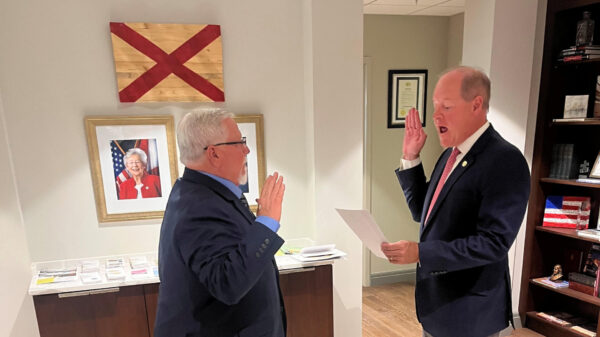By Brandon Moseley
Alabama Political Reporter
As the final votes are tallied by the Secretary of State’s office, GOP candidate Roy Moore has no chance to overtake Sen.-Elect Doug Jones.
Alabama Secretary of State John Merrill released the updated numbers on the military/oversees and provisional ballots in the last weeks Senate election on Wednesday. Even if Moore wins all of both sets of ballots, which is highly unlikely, he still won’t have enough votes to overtake his opponent, Democratic candidate Jones.
Merrill’s office said in a statement that there have been several questions raised about the number of Uniformed and Overseas Citizens Absentee Voting Act ballots and provisional ballots cast in last week’s special election for the United States Senate.
Those ballots were counted by the individual counties on Dec. 19, 2017, and will be included in the vote totals transmitted to the Secretary of State’s Office no later than Friday, Dec. 22, 2017, as prescribed by Alabama law.
According to Merrill, the total number of ballots transmitted to our state’s UOCAVA voters was only 485. The number of UOCAVA ballots actually returned is 366 at this time. No additional ballots are eligible to be received.
As of today, the total number of provisional ballots received is 4,967, and 2,888 of those have been verified at this time. No additional ballots are eligible to be received.
Both UOCAVA ballots and approved provisional ballots will be counted and added to the totals before the counties certification deadline – as established by Alabama law – which is Dec. 22, 2017. These votes are not listed or identified separately. These votes are integrated in the final box by box and county totals.
On Monday, Merrill ordered the counties to document and identify the write-in votes in last Tuesday’s special election for U.S. Senate.
Merrill said that this decision on whether to count these ballots was made based on Act 2016-450, which provides, upon a determination that the number of write-in votes for the position is greater than or equal to the difference in votes between the two candidates receiving the greatest number of votes for the Senate seat.
As of today, the difference between the two candidates’ total votes is 20,634, and the total number of write-in votes cast was 22,814.
In theory, some of the people who wrote in candidates could have written in Moore or Jones, and that could affect the final vote totals. Similarly, the only write-ins that count have to be for someone eligible to be elected to the Senate. Votes for cartoon characters or fictional characters will be discarded from the 1.7 percent of ballots cast for write-ins.
Final certification will occur once the vote has been reviewed and certified by the State Canvassing Board – a board which consists of Gov. Kay Ivey, Merrill and Attorney General Steve Marshall. This board has until Jan. 3, 2018, to certify, but this process could occur as early as Dec. 26, 2017.
As of last count, Jones had 49.9 percent of the votes cast, and Moore had just 48.4 percent of the vote. If the provisional ballots, write-ins and the military ballots were to narrow that gap to just .5 percent, then an automatic recount could be triggered, though even that seems highly unlikely at this point.
“This has been a very close race and we are awaiting certification by the Secretary of State,” Moore said last week.
Merrill will meet with the Alabama State Canvassing Board to certify the results of the Alabama Senate special election no sooner than Dec. 26, 2017, and no later than Jan. 3, 2018.













































